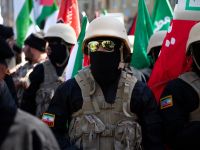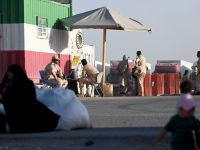The European Union and the United States argued Tuesday for a new scale of contributions which would see about 20 developing countries pay much more for UN peacekeeping.
Speaking for the EU, the French ambassador to the United Nations, Jean-David Levitte, drew the attention of the UN's budget committee to "considerable anomalies" in the 27-year-old scale of peacekeeping dues.
"About 20 countries whose per capita income is higher than the world average are still granted a considerable reduction of 80 to 90 percent for no currently valid reason," he said.
The committee was meeting for the second day in public session to discuss revisions to the scale of peacekeeping operations, which are expected to cost 2.2 billion dollars this year.
At present, a developing country's share of the cost of peacekeeping is 80 or 90 percent lower than its share of the UN's regular budget.
The discounts are offset by a 25 percent premium on regular budget dues paid by the five permanent members of the Security Council: Britain, China, France, Russia and the United states.
Other developed countries pay the same percentage contribution to peacekeeping as they do to the regular budget.
Premiums paid by Britain and France push the EU share of peacekeeping costs to 39 percent, compared with a 36.7 percent share of the regular budget.
Levitte recalled that the EU's share of the global economy was 29.4 percent.
He agreed that the permanent five, or P-5 as they are known, "must assume a special responsibility" for financing peacekeeping operations, which cannot be set up without the authority of the Security Council.
But he said the 25 percent surcharge paid by the P-5 should be reduced to 15 percent.
The US ambassador to the UN, Richard Holbrooke, pointed out that when the peacekeeping scale was adopted, as a provisional measure, in 1973, the P-5 were still among the top six contributors to the UN's regular budget.
Today, he said, 19 countries paid more than the smallest contributor among the P-5, China.
Holbrooke paid tribute to 18 countries, which had publicly said they were willing to pay more towards the costs of peacekeeping.
He named them as Antigua and Barbuda, Bahrain, Bulgaria, Cyprus, Estonia, Hungary, Israel, South Korea, Kuwait, Latvia, Malta, Oman, The Philippines, Qatar, Romania, Saudi Arabia, Slovenia and the United Arab Emirates.
"Their leadership has paved the way," he said.
But Holbrooke argued that it would be unreasonable to expect all these nations to jump straight from Category C, the developing countries, to Category B, the developed, non-permanent council members.
"A simple, rigid distinction between 80 percent and no discount strikes us as untenable," he said.
"We would support the creation of a new group for middle-income countries," he said.
He also favored a more flexible scale including "automatic updates, so that when countries get richer they move up and when they are in economic difficulties they move down, no questions asked."
While several developing countries had become much richer since 1973, Holbrooke said, he singled out South Africa as "a victim of the failure of the UN's fifth (budget) committee to adopt a more flexible system."
South Africa wants to move out of group B by January, irrespective of whether a new system is in place by then.
"We support South Africa's position," Holbrooke said.
The committee began discussing the regular budget scale on Monday and is scheduled to continue informal consultations until the end of next week.
Echoing remarks made by Holbrooke on Monday, Levitte told reporters it was important to move quickly on revising the scales of contributions.
"If, by the end of December, there is no agreement on a new scale of contributions, the mood will turn sour," he said, and the momentum created by last month's UN Millennium Summit would be lost -- UNITED NATIONS (AFP)
© 2000 Al Bawaba (www.albawaba.com)







